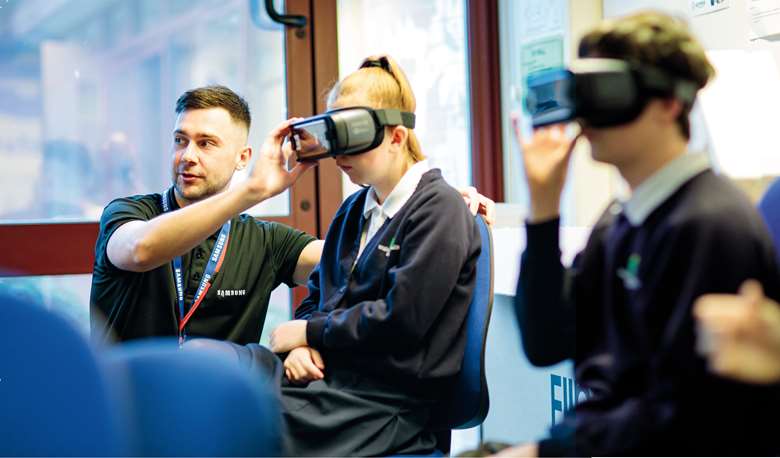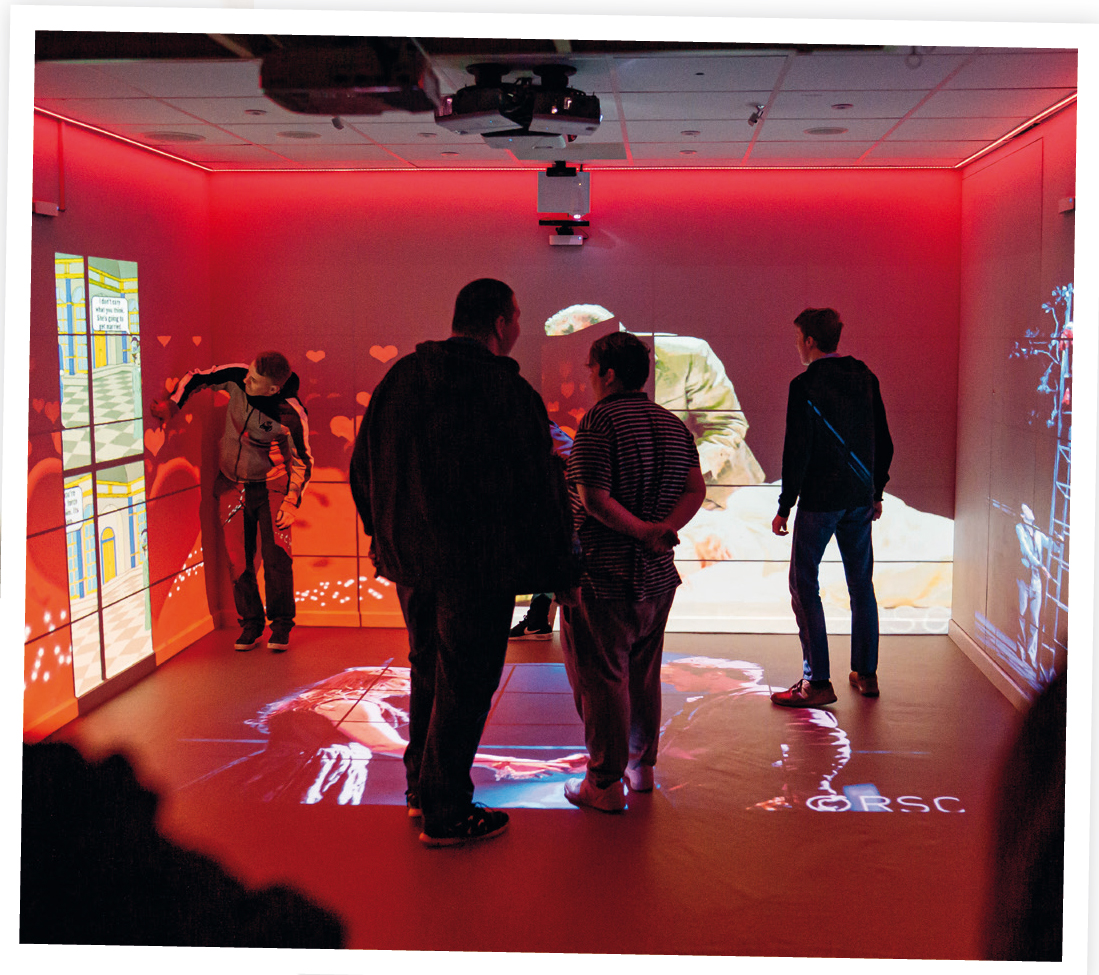IT or not IT?
Dan Clay
Friday, May 1, 2020
Dan Clay learns about an award-winning collaboration which took immersive theatre making and technology into a school to explore Romeo and Juliet

SAM ALLARD
IT or not IT? If that is indeed the question then the RSC, whose two day collaboration with a local school and Samsung scooped a top accolade at this year's BETT awards, certainly has the answer – thanks to a truly innovative approach to Shakespeare.
Winning the ‘Collaboration With A School’ prize, their efforts saw over 180 students at Welcombe Hills School in Stratford-Upon-Avon turn their educational setting into a live theatre space over the course of two days, utilising some immersive and multi-sensory technology to explore Romeo and Juliet in a highly accessible way.
Thanks to some futuristic tech from Samsung, such as VR headsets and 360 degree cameras, the school turned rooms such as their hall and Drama studio into sensory spaces to place students into the world of the young lovers. The latter became the tomb while the former doubled up as a marketplace, for example, all of which helped pupils explore the story through a variety of activities on site which included designing short promo videos and trailers for their own film version of the play.
Catering for a range of abilities
With pupils aged between 3 and 19 having a wide range of additional needs including complex Moderate Learning Difficulties (MLD), Severe Learning Difficulties (SLD) and Autistic Spectrum Disorder (ASD), teachers at Welcombe Hills were more than ready for the challenge such a project would bring.
‘As a newly appointed teacher my experience as an RSC actor was so useful,’ explains Hannah Young, a Drama teacher at the school. ‘I could imagine how the spaces might look and feel to give our students a truly immersive experience of the story of Romeo and Juliet.’
‘We are lucky to work with amazing teachers and TA's here at Welcombe Hills who have such a wealth of experience in designing and delivering work for students with such a wide range of needs. So the challenge is something we as a school take every day, and this project was another example of how we adapt our work to suit all of our student's needs.’
But with even the most resourceful teacher often having to find new ways to enthuse students either unfamiliar with or indifferent to the Bard, how did the school utilise the technology provided by Samsung to transport students to the streets of Verona?
Shakespeare experts on hand
It helped that they had the RSC at hand. As a ‘Lead Associate School’ in the theatre company's Associate Schools Programme, which aims to transform the way schools, teachers and pupils experience Shakespeare by using the same approaches RSC actors use in rehearsal, their long-standing relationship with the company meant help was always at hand.

The school's multi-sensory room became the setting for the Capulets’ ball
‘The RSC gave a huge amount of support to the project, assigning actors and practitioners to work on different parts of the experience and by offering us full use of their extensive props department,’ adds Hannah. This is something that clearly bore fruit on a practical level to ensure students were fully immersed in the experience given the nature of how the school was transformed for those two days.
‘A huge amount of additional work went into preparing for this two-day takeover,’ explains Jacqui O’Hanlon, Director of RSC Education. ‘Taking place at the school itself meant that the team could create specific zones and really utilise all of the available space. For example, the school's multi-sensory room allows immersive projection via three walls. During the takeover this room became the setting for the Capulets’ Ball. Featuring a series of interactive projections, at the touch of a button, students were able to ‘try on’ different masks for the ball, re-enact the moment when Romeo and Juliet first meet and use touch-screens to access and explore the text and what the characters said to each other.’
‘Elsewhere, the school's climbing frame was transformed into the famous balcony; the drama room became the tomb; the school hall a marketplace; and over in the school's garden, an RSC actor played the role of Friar Lawrence and created a multi-sensory apothecary bursting with herbs and potions that he would have used.’
Passionate young people
However, the project would never have come about had it not been for the school's ‘Shakespeare Squad’, a team of 20 or so like-minded students whose aim – to explore Shakespeare further in the school – led to the collaboration.
‘The original squad were made up of students who took part in our first playmaking festival in 2018 but have since grown in numbers,’ Hannah Young explains. ‘Some of these students sit on the Youth Advisory board at the RSC and have become real ambassadors for a fresh approach to the teaching of Shakespeare in schools.’
So what did the students themselves make of the whole experience? Did they find the technology opened up Romeo and Juliet in ways they hadn't even thought of?
‘I played Juliet and it felt like History coming to life,’ Year 12 student Natalie recalls. ‘When you put the VR on it is like you are in a different world. Even your touch and feeling feels like you are in space, even though you know it is not real you don't think that is it not real.’
Bonnie, another Year 12 student at Welcombe Hills, agrees: ‘I liked the VR headset. When I put them on it felt like being in a different dimension. It was really cool. I was in school but when I put them on it was like I wasn't in school.’
‘I remember we went into a dark room and acted the scene of Romeo and Juliet. I pretended to be dead and Hannah played Friar Laurence. I like acting, it's really good because I can be someone else and not me. I was really proud to hear that we won an award. I was speechless!’ she adds.
Benefits for teachers
And the school's staff? How has this experience changed or deepened their perspective on teaching Shakespeare for future years?
‘The Romeo and Juliet takeover was a true collaboration where we were able to explore how technology can play a part in engaging pupils with Shakespeare's work,’ enthuses Jo Bradley, Assistant Headteacher at the school. ‘It was a truly memorable experience. The school was buzzing with excitement and teachers saw increased curiosity and motivation in pupils, and the attention and focus needed to deepen their learning and understanding.’
‘The pupils were challenged and inspired and teachers found new, creative approaches which could be used across the whole of the curriculum. We demonstrated how we could use Shakespeare as a catalyst to progress in all other curriculum areas. Our collaboration with the theatre throughout the years has enhanced and supported the lives of our students and staff and we are excited about future developments. We hope to continue to explore further ways in which we can use Shakespeare to enrich our pupils’ lives.’
For now though it seems the Shakespeare Squad is basking in a little glory. ‘The Award has been an incredible recognition of the work we do here at school to open up the world of Shakespeare to our young people,’ Hannah Young tells us, ‘It's displayed at school with real pride!’

